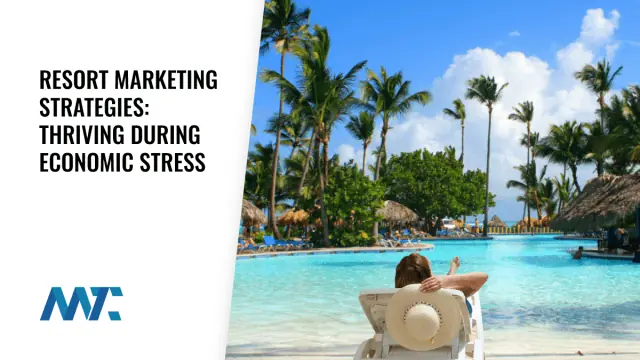In times of economic uncertainty, one might expect luxury or discretionary spending to be the first budget cut. However, history and recent trends demonstrate that people prioritize improving their quality of life even during challenging times, with travel being a prime example. You can still attract guests and thrive with the right marketing strategies. Here, we’ll explore how to craft and implement effective marketing strategies for resorts to maximize occupancy and drive revenue while maintaining ethical practices.
Ethical Marketing and the Customer Mindset
Under economic stress, people tend to re-evaluate their values and priorities. While large expenditures might see a decline, there’s a notable shift toward experiences that can bring joy and rejuvenation. This shift includes indulgences such as vacations that offer mental and emotional relief. For many, a stay at a resort provides the perfect escape to unwind, reconnect with oneself, or spend quality time with loved ones.
It’s important to note the phenomenon of revenge spending, where individuals, despite financial hardships, indulge in luxury items or experiences to compensate for their stress or restrictions. While this trend can benefit resorts, it’s crucial to market ethically and avoid exploiting vulnerable consumers.
To market ethically while acknowledging the reality of revenge spending:
Focus on value rather than luxury
Offer flexible payment options
Promote responsible spending
Emphasize experiences over materialism
Be transparent about costs
Targeting and Segmentation
Segmenting your audience is key to an effective marketing strategy. Not all travelers are the same; understanding the unique needs and preferences of different segments can help tailor your offerings. Key segments include families, couples, solo travelers, and business travelers.
Specialized marketing platforms like Cendyn and Revinate offer advanced CRM tools to help resorts effectively segment their audience and deliver personalized marketing messages. These platforms allow you to track guest preferences, behaviors, and spending patterns, enabling highly targeted marketing campaigns.
Leveraging Digital Marketing Platforms
Digital marketing remains a powerful tool for reaching your audience effectively. Key strategies include:
Social Media Marketing: Platforms like Facebook and Instagram are essential for visual storytelling and engagement. Use tools like Agorapulse or Buffer to manage multiple social media accounts efficiently.
Content Marketing and Blogging: Create valuable content that attracts and engages potential guests. Platforms like WordPress or HubSpot can help manage your content strategy.
Email Marketing: Use resort-specific platforms like Cendyn or Revinate to create personalized email campaigns based on guest data and preferences.
Online Travel Agencies (OTAs) and Review Sites: Maintain a strong presence on platforms like Agoda, Booking.com, Expedia, Hotels.com, Kayak, Orbitz, Priceline, Travelocity, Trip.com, and Tripadvisor. Tools like Revinate can help manage your online reputation across these platforms.
Promotions, Packages, and Experiences
Special promotions and packages can be particularly enticing in economically stressed times. Consider offering early bird discounts, last-minute deals, all-inclusive, and seasonal or themed packages.
Modern travelers are increasingly prioritizing wellness and authentic experiences. Resorts can capitalize on this trend by offering wellness programs and promoting experiential activities that immerse guests in local culture and nature.
Building Strong Customer Relationships
Creating lasting relationships with your guests can foster loyalty and word-of-mouth referrals. Strategies include personalized communication, loyalty programs, and exceptional customer service.
Specialized platforms like Kognitiv focus on creating and managing loyalty programs for resorts, while tools like Flip.to can turn your guests into brand advocates by encouraging them to share their experiences on social media.
Measuring and Optimizing Performance
It’s crucial to measure the performance of your marketing efforts to understand what works and what doesn’t. Use analytics tools to track various metrics and regularly review this data to refine and optimize your marketing strategies.
Many resort-specific marketing platforms like Tambourine and Vizergy offer comprehensive analytics and reporting features. These tools can help you track the success of your campaigns across various channels, measure ROI, and make data-driven decisions to improve your marketing efforts.
Leveraging technology can significantly enhance the guest experience and streamline operations. Consider implementing mobile apps, virtual reality tours, and AI-powered chatbots. Platforms like Cloudbeds offer integrated solutions combining property management with marketing tools, allowing seamless guest experiences from booking to check-out.
Marketing a resort effectively during economic stress is not only possible; it’s an opportunity to demonstrate the value of your offerings. By understanding your audience, leveraging the right platforms and strategies, offering appealing promotions, and focusing on wellness and experiences, you can attract guests who value the positive impact a stay at your resort can have on their well-being.
Embrace technology and personalization to create memorable experiences that keep guests returning, ensuring your resort thrives regardless of the economic climate. Utilize resort-specific marketing platforms and tools to streamline your efforts and gain valuable insights into your guests’ preferences and behaviors.
Most importantly, maintain ethical marketing practices that respect your guests’ financial well-being while highlighting your resort’s unique value. By combining these strategies with the power of specialized marketing tools, your resort can navigate economic challenges and emerge stronger, with a loyal customer base and a compelling market presence.
©2024 DK New Media, LLC, All rights reserved. | Disclosure
Originally Published on Martech Zone: Resort Marketing Strategies: Thriving During Economic Stress

